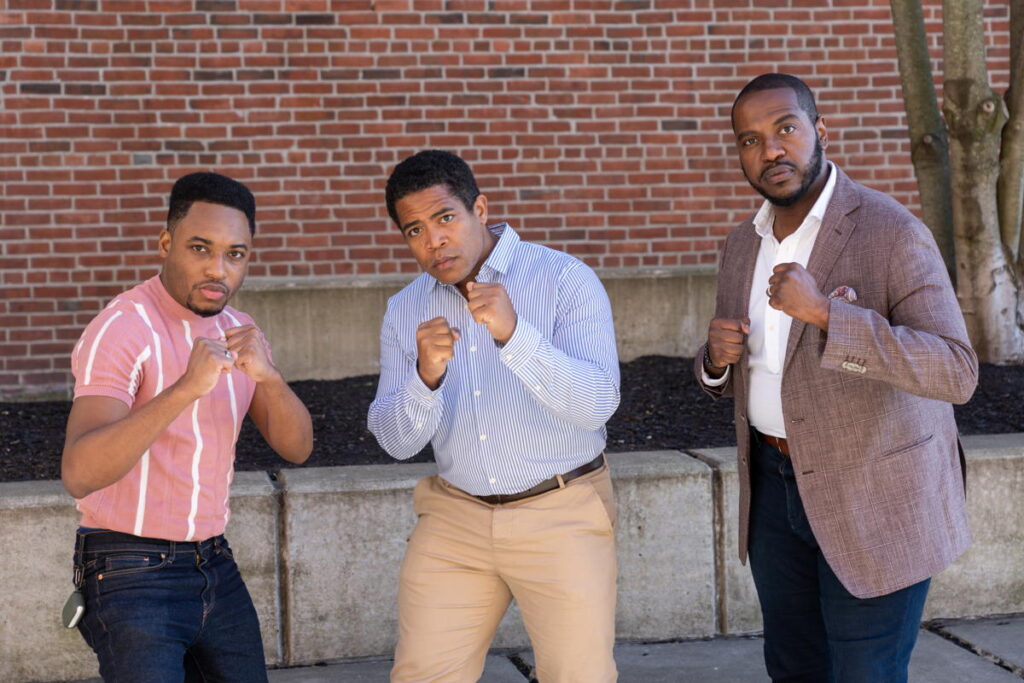
by Shelley A. Sackett
“Champion: An Opera in Jazz.” Music by Terence Blanchard; Libretto by Michael Cristofer. Music Direction by David Angus; Music Conductor – Kwamé Ryan; Set Design by Sara Brown; Costume Design by Trevor Bowen; Lighting Design by Marcus Doshi. Produced by Boston Lyric Opera at the Emerson Cutler Majestic Theatre, 219 Tremont Street, Boston. (Run has ended)
Switching gears overnight due to pandemic-related issues, Boston Lyric Opera is to be commended for its recent perseverance and quick-footed adaptability. Instead of offering three performances of “Champion: An Opera in Jazz” as a full opera as rehearsed and planned, the company pivoted to only two concert-style productions with the masked orchestra on stage, costumed chorus in balcony box seats and main performers making do with a sliver downstage.
The only downside to the downsizing was that fewer people were able to experience this ambitious, modern masterwork that brings to life boxer Emile Griffith’s complicated story through a heart-rending melding of music styles and poignant lyrics. By the show’s end — at least in my row — there was not a dry eye. And isn’t that, after all, why we go to the theater and especially to opera? To feel?
The synopsis provided in the playbill is not a spoiler, but an essential guide. The scenes flip from present to past (with the magnificent Brian Major and Markel Reed respectively playing Emile today and during his boxing hey days of the 1960s) and without a roadmap, it’s easy to get lost.
Emile Griffith was not your typical boxer. Born on St. Thomas in the 1950s, he and his many siblings are abandoned by his mother, Emelda. As a youngster, Emile dreams of reuniting with his mother and becoming either a hat maker, a singer or a baseball player. Eventually, he finds her in New York and she introduces him to the hat manufacturer, Howie Albert. But, instead of offering Emile a job making hats, Howie focuses on Emile’s physique and pegs him as a welterweight boxer. He offers to train Emile, and with Emelda’s encouragement (and nose for money), Emile’s artistic dreams fade away.
The trouble is, Emile is gay at a time and in a profession where that is simply not an option. When Benny “Kid” Paret taunts Emile about being a “maricon,” (a Spanish insult for homosexuals) before and during their high-profile match in 1962, it is as if Benny has waved a cape during a bullfight. Emile literally sees red and in seven seconds delivers the 17 blows that will send Benny to the hospital in a coma, where he will die 10 days later.
Emile sits outside Benny’s room those long 10 days, wanting to say he is sorry and begging for forgiveness. His request is denied, and for the rest of his life, that lack of closure will wrack his soul and shake his faith.

Courtesy of David Angus, Boston Lyric Opera
Fifty years later, Emile struggles with the chronic traumatic brain injury, the result of “boxer’s brain” and a brutal beating he suffered outside a gay bar. The opera opens as Luis, his caregiver/adopted son/partner, helps dress him, reminding him of a special meeting they are scheduled to attend. Emile’s mind is afloat, uneasily alighting on memories of his fight with Benny and his own beating at the hands of bigots. He is confused over the smallest action, such as putting on his shoes. He sometimes doesn’t know who or where he is.
Yet during moments of clarity, he remembers his past and the twist of fate that transformed his prized fists into weapons, forever rewriting his legacy from Champion Boxer to murderer.
During these times, he poses some very deep and heart wrenching questions.
“What makes a man a man; the man he is?” Emile wonders. “Who is this man who calls himself me?” Resigned to a life where redemption is beyond his grasp, he accepts his fate, believing he deserves it. “I go where I go,” he explains.
Blanchard’s music keeps the audience riveted and guessing as he winds from the full-throated operatic to slinky, smoky note-bending jazz to a gospel-tinged chorus to a N’awlins style second line. It’s the musical analog to Alvin Ailey’s “Revelations.”
The cast relishes every note. Baritones Major and Reed are nothing short of spectacular as Emile, both as actors and opera singers. Major is a big guy (think Paul Robeson), yet he controls that physicality to appear graceful and vulnerable. Reed is his foil, a compact pretty boy, all sinew and chartreuse satin. And man, can these guys sing.
The rest of the cast are equally noteworthy, from Tichina Vaughn as Emelda to Terrence Chin-Loy as Benny, Jesus Garcia as Luis, Stephanie Blythe as Kathy and Wayne Tigges and Neal Ferreira as Howie and the Ring announcer.
At the end of the day, however, we can’t help but wonder how Emile, in hindsight, might answer this question: was it worth it?

